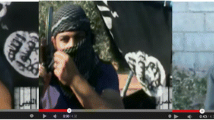Abstract
Drawing on comparative case studies, the research elucidates competing constructions of justice, responsibility, and victimhood articulated in response to September 11, 2001 on three digital discourse fora in Brazil, France, and the United States. The research extracts the moral metaphors through which Brazilian, French, and American participants judge the terrorist acts. It contrasts the underlying moral accounting schemes employed to legitimize or delegitimize the use of terrorism on 9/11. Two contrasting standpoints on political violence and associated moral underpinnings are elucidated: the morality of retribution and the morality of absolute goodness (Lakoff 2002). One ideological faction uses the morality of retribution to hold the US accountable for inciting the terrorists to act. For these individuals, political violence can be seen as a form of action that upholds a binary framing of moral order in which all moral debts must be paid. By contrast, opposing camps employ the morality of absolute goodness to condemn the terrorists by arguing that terrorist violence is inherently unjustifiable, as it necessarily results in human suffering.
Similar content being viewed by others
References
Abdulla, R. (2007). Islam, jihad, and terrorism in post-9/11 Arabic discussion boards. Journal of Computer-Mediated Communication, 12, http://jcmc.indiana.edu/vol12/issue3/abdulla.html
Ayres, J. (1999). From the streets to the internet: The cyber-diffusion of contention. American Academy of Political and Social Science Annals, 566, 132–143.
Bhargava, R. (2002). Ordinary feelings, extraordinary events: Moral complexity in 9/11. In C. Calhoun, P. Price, & A. S. Timmer (Eds.), Understanding September 11. New York: New.
Cerulo, K. (1998). Deciphering violence: The cognitive structure of right and wrong. New York: Routledge.
Collins, R. (2004). Rituals of solidarity in the wake of terrorist attack. Sociological Theory, 22, 53–87.
Eliasoph, N. (1998). Avoiding politics: Producing apathy in everyday life. Cambridge, UK: Cambridge University Press.
Gamson, W. (1992). Talking politics. New York: Cambridge University Press.
Hine, C. (2000). Virtual ethnography. Thousand Oaks: Sage.
Kohut, A., & Stokes, B. (2006). America against the world: How we are different and why we are disliked. New York: Henry Holt.
Lakoff, G. (2002). Moral politics: How liberals and conservatives think. Chicago: The University of Chicago Press.
Lipset, S. M. (1996). American exceptionalism: A double-edged sword. New York: Norton.
Roger, P. (2002). l’Ennemi américain généalogie de l’antiaméricanisme français. Paris, France: Editions du Seuil.
Ross, M. H. (2002). The political psychology of competing narratives: September 11 and beyond. In C. Calhoun, P. Price, & A. S. Timmer (Eds.), Understanding September 11. New York: New.
Schultz, T. (2000). Mass media and the concept of interactivity: An exploratory study of online fora and reader email. Media, Culture, & Society, 22, 205–221.
Spillman, L. (1997). Nation and commemoration: Creating national identities in the United States and Australia. Cambridge: Cambridge University Press.
Van Dijk, T. (1998). Ideology: A multidisciplinary approach. London: Sage.
Vengerfeldt, P. (2003). The internet as a news medium for crisis: News of terrorist attacks in the United States. In M. Noll (Ed.), Crisis communications lessons from September 11. London: Rowman and Littlefield.
Wagner-Pacifici, R. E. (1986). The moro morality play: Terrorism as social drama. Chicago: The University of Chicago Press.
Yúdice, G. (2004). US prepotencia: Latin Americans respond. In A. Ross, & K. Ross (Eds.), Anti-Americanism (pp. 69–86). New York: New York University Press.
Zeruvabel, E. (1997). Social mindscapes: An invitation to cognitive sociology. Cambridge: Harvard University Press.
Author information
Authors and Affiliations
Corresponding author
Rights and permissions
About this article
Cite this article
Robinson, L. The Moral Accounting of Terrorism: Competing Interpretations of September 11, 2001. Qual Sociol 31, 271–285 (2008). https://doi.org/10.1007/s11133-008-9108-y
Published:
Issue Date:
DOI: https://doi.org/10.1007/s11133-008-9108-y




